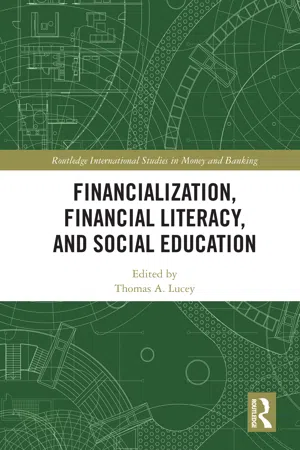
Financialization, Financial Literacy, and Social Education
- 282 pages
- English
- ePUB (mobile friendly)
- Available on iOS & Android
Financialization, Financial Literacy, and Social Education
About This Book
The objective of this book is to prompt a re-examination of financial literacy, its social foundations, and its relationship to citizenship education. The collection includes topics that concern indigenous people's perspectives, critical race theory, and transdisciplinary perspectives, which invite a dialogue about the ideologies that drive traditional and critical perspectives.
This volume offers readers opportunities to learn about different views of financial literacy from a variety of sociological, historical and cultural perspectives. The reader may perceive financial literacy as representing a multifaceted concept best interpreted through a non-segregated lens. The volume includes chapters that describe groundings for revising standards, provide innovative teaching concepts, and offer unique sociological and historical perspectives. This book contains 13 chapters, with each one speaking to a distinctive topic that, taken as a whole, offers a well-rounded vision of financial literacy to benefit social education, its research, and teaching. Each chapter provides a response from an alternative view, and the reader can also access an eResource featuring the authors' rejoinders. It therefore offers contrasting visions about the nature and purpose of financial education. These dissimilar perspectives offer an opportunity for examining different social ideologies that may guide approaches to financial literacy and citizenship, along with the philosophies and principles that shape them. The principles that teach and inform about financial literacy defines the premises for base personal and community responsibility.
The work invites researchers and practitioners to reconsider financial literacy/financial education and its social foundations. The book will appeal to a range of students, academics and researchers across a number of disciplines, including economics, personal finance/personal economics, business ethics, citizenship, moral education, consumer education, and spiritual education.
Frequently asked questions
Information
Table of contents
- Cover
- Half Title
- Series
- Title
- Copyright
- Contents
- List of figures
- List of tables
- List of contributors
- Introduction
- 1 Disrupting the alibi: toward a postcolonial financial literacy and entrepreneurship ideal
- 2 ‘Pākehā get more money than the other cultures’: teaching Pāsifika students with and for a social justice orientation
- 3 Noticing and questioning capitalism with elementary students
- 4 Exploring how developmental theories could shape the integration of financial education into K-3rd grade curriculum
- 5 Financial literacy education reforms in Québec, Ontario, and North Carolina: cautionary tales for the social studies
- 6 Financial literacy, financial liberation: toward a critical race approach to financial education
- 7 Theorizing race for economics education: a juxtaposition of Carter G. Woodson and Frantz Fanon
- 8 The Québec Financial Education Program: a necessary change of perspective
- 9 “And I know the money don’t really make me whole”: feminist financial literacy through Hip-Hop pedagogy
- 10 Financial socialization: past, present, and future
- 11 The power of relational work: reimagining new forms of financial citizenship through sociability
- 12 Transdisciplinary financial literacy
- 13 Piggy banking to personal banking: toward a sociocultural mixed methods approach to advance research in financial literacy
- Conclusion
- Index